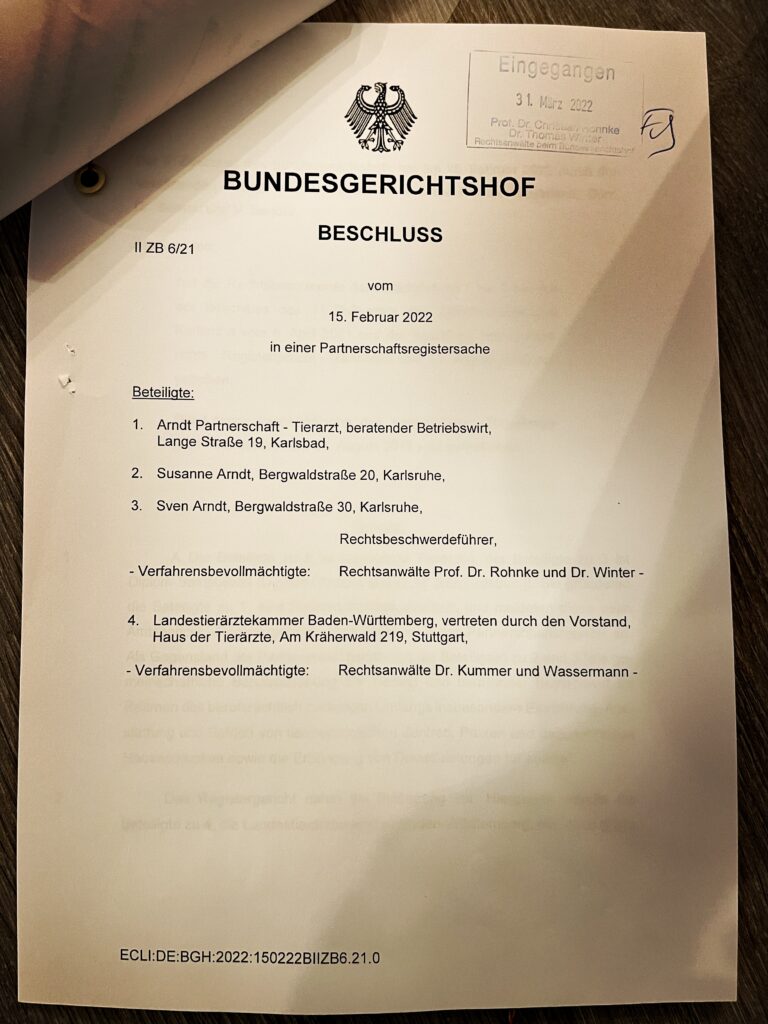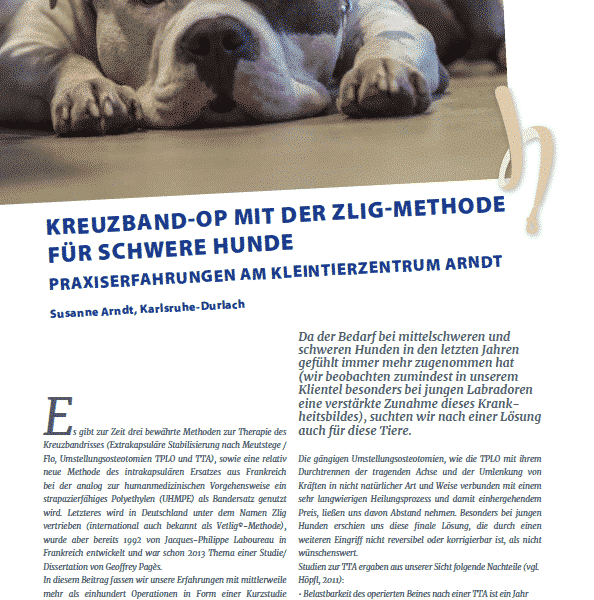
Legality of partnerships between veterinarians and business economists
Legality of partnerships between veterinarians and business economists https://doc4pets.de/wp-content/uploads/2022/04/IMG_4371-768x1024.jpg 768 1024 Sven Jan Arndt Sven Jan Arndt https://secure.gravatar.com/avatar/ fef64081df258be6f19e1e0033636b82?s=96&d=mm&r=gBackstory :
Veterinarian Susanne Arndt ran three small animal practices in the Karlsruhe area in the usual legal form for freelancers - a one-person company. As growth increased, the desire arose to convert it into a GmbH. However, the Conversion Act requires a registered legal form (even if it is just a registered merchant). However, the latter is not possible for a freelancer because he is not a businessman. Ergo, the only option was to found a partnership - consisting of freelancers (here: veterinarian and business economist). It was founded and also registered by the AG Mannheim.
The case:
The Baden-Württemberg State Veterinary Association applied for the deletion of this company on the basis of Section 21a BO because, according to their professional regulations, a partnership is only possible between veterinarians. Parodoxically, at the same time she pointed out to the two shareholders that they could implement their plan in the form of a GmbH!?
The decision of the BGH of February 15, 2022 - II ZB 6/21 - OLG Karlsruhe / AG Mannheim:
"A partnership between a veterinarian and a business economist is permissible according to the Medical Professions Chamber Act of the state of Baden-Württemberg."
The reasons given by the BGH:
The professional regulations of the LTK BW are not a formal state law, which is why the BGH was able to decide without involving the BVerfG.
§21a BO violates the priority of §30a Paragraph 1 Sentence 2 of the Baden-Württemberg Medical Professions Chamber Act (hereinafter: HBKG BW), according to which veterinarians can run a practice together with people in accordance with §2 Paragraph 1 No. 3 HBKG BW who have a state training occupation in the health sector, a scientific or social education profession.
The interprofessional associations of chamber members permitted by the HBKG BW cannot be restricted by the chambers' statutes.
There are therefore no public interest concerns that preclude interprofessional collaboration with a business economist (among other things because of Art. 12 Para. 1 GG - free practice of the profession but also §30a HBKG BW is not to be understood conclusively)
Such cooperation does not contradict the meaning and purpose of the HBKG BW, because “the definition of the permitted forms of professional practice should ensure that compliance with professional obligations in medical activities can be enforced in all legal forms . ”
At this point the judgment becomes exciting , because it goes on to say:
“The legislature wanted to fundamentally exclude commercial medical activity. Partnerships and legal entities are commercially active, but not members of the freelance professions... which includes a business economist.... The legislature has therefore only set out detailed requirements in Section 30a (2) HBKG BW for medical professional activity in legal entities in order to exclude commercial medical professional activity.”
And this is particularly exciting when you take a closer look at this paragraph:
§ 30a (2) HBKG BW:
The medical activity for a legal entity under private law requires that
- The object of the company is the exclusive performance of medical activities,
2. all partners are persons according to paragraph 1 sentence 2,
3. the majority of the company shares and voting rights belong to chamber members in accordance with Section 2 Paragraph 1 Numbers 1 to 3 or Number 5 and company shares are not held for the account of third parties,
4. at least half of the persons authorized to manage the business are chamber members in accordance with Section 2 Paragraph 1 Numbers 1 to 3 or Number 5,
5. a third party does not participate in the company's profits,
6. there is sufficient professional liability insurance for the legal entity under private law and the professionals working there and
7. it is guaranteed that the medical professional activity is carried out by the chamber members in accordance with Section 2 Paragraph 1 Numbers 1 to 3 or Number 5 on their own responsibility, independently and not commercially.
The details are regulated by the respective professional regulations.„
If you now follow this passage from the HBKG BW, to which the BGH explicitly refers, what does this mean for chains like Evidensia or Anicura in Baden-Württemberg? Shouldn't the Baden-Württemberg State Veterinary Association intervene immediately and ban this?
duty of confidentiality are also extremely interesting :
“After all, a veterinarian (Section 2 Paragraph 1 No. 3 HBKG BW) - unlike the chamber members covered by Section 30a Paragraph 1 Sentence 2 ... has no right to refuse to give evidence in accordance with Section 53 Paragraph 1 No. 3 StPO. In contrast to the other chamber members ... a veterinarian does not have a special relationship of trust with his client, which includes and requires the protection of confidential matters worthy of protection (cf. BVerfGE 38, 312, 323 f.)."
Conclusion from our point of view:
- Not everything that state veterinary associations write in their professional regulations is inviolable.
- With the clear reference to Section 30a Paragraph 2 HBKG BW, the Baden-Württemberg State Veterinary Association has been given a clear mandate to check the local chains operated by financial investors and to intervene accordingly.
- We are excited to see whether this will happen and thus ensure legal certainty!
- Published in:
- Right



